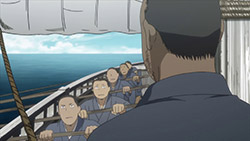 |
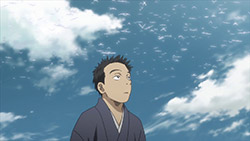 |
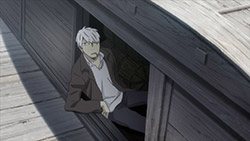 |
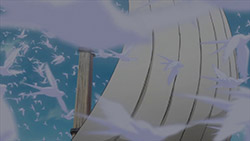 |
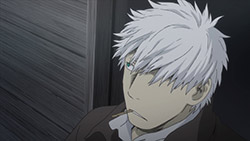 |
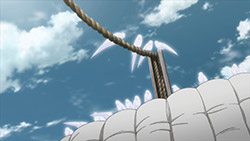 |
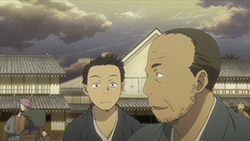 |
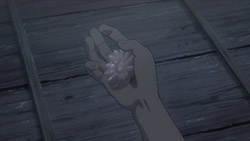 |
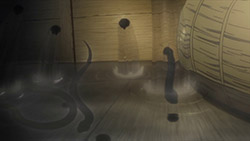 |
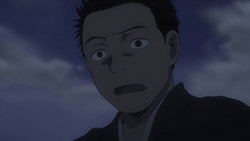 |
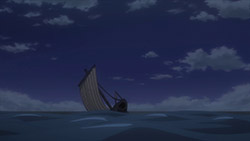 |
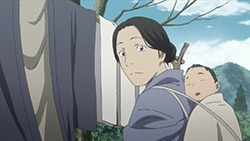 |
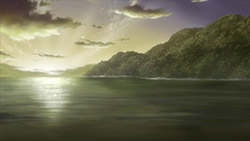 |
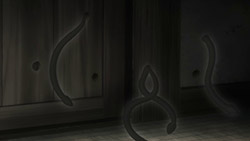 |
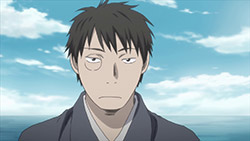 |
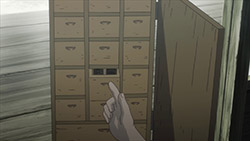 |
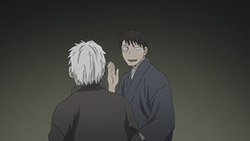 |
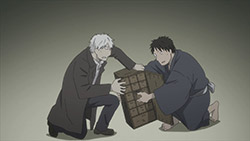 |
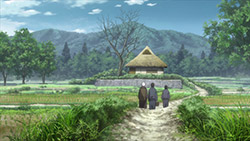 |
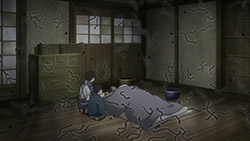 |
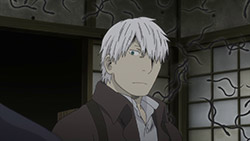 |
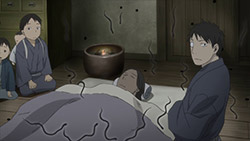 |
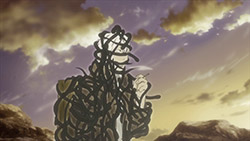 |
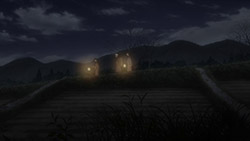 |
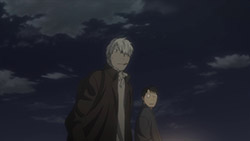 |
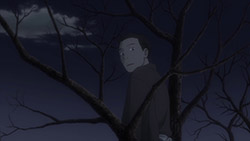 |
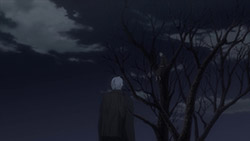 |
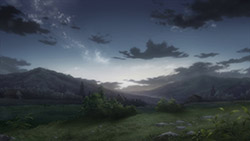 |
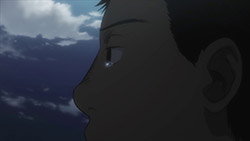 |
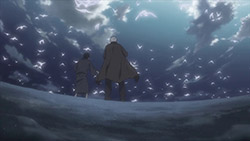 |
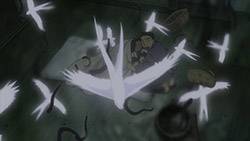 |
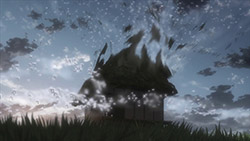 |
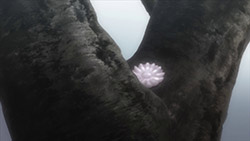 |
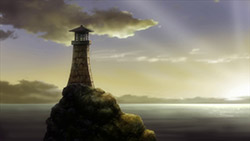 |
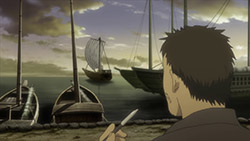 |
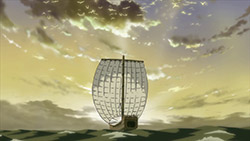 |
「風巻立つ」 (Kazetatsu)
“Wind Raiser”
There’s an even more elemental quality than usual to Mushishi lately.
If you’ve been an anime fan long enough to remember the first go-around for Mushishi, no one could blame you for feeling a little bit uneasy about the current state of affairs with the series. The final six episodes of the first series were originally cancelled, then shifted to DVD only (Blu-ray was just launching as a consumer product), and finally broadcast several months after the first 20. It sold quite well, but Artland has done very little since and their finances were uncertain when Zoku Shou was announced. No new episode for two weeks our of three does nothing to relieve that uncertainty – production delays were certainly the cause of last week’s “encore” of the special, though whether it was an issue of finances or the production process itself is anyone’s guess. With 18 chapters still planned all we can do is hope for the best.
Watching an episode of Mushishi, then or now, would give you few clues that anything might be amiss – the series is still utterly beautiful, though Artland and Nagahama-sensei have always achieved this mostly through gorgeous backgrounds and a minimalist style (which the manga shares) rather than truckloads of sasuga animation. And it’s a peculiarity of Urushibara Yuki’s manga that Mushishi seems particularly Japanese in both form and content, yet is also undeniably universal – for all that Mushi are in a sense the ultimate Shinto expression, the emotional themes are not at all culture-specific. And as distinctly Japanese as the landscapes are, you wouldn’t have to squint too hard to see an episode like this playing out in Portugal or Chile, or even Polynesia.
Mushi are themselves practically elements – one might almost argue they represent the “element” life, as if it were akin to air or Earth or fire – so it isn’t surprising that there’s an elemental feel to many Mushishi chapters. There’s a Jungian quality to this series, in the archetypes of the collective unconscious sense. But this season seems more literal about it than most – cold, rain, and now wind have been the centerpiece of recent episodes. The young man at the center of “Wind Raiser” is Ibuki (Yosuke Saito, yet another seemingly brand-new seiyuu). He’s a sailor who has a very special ability – with his whistle he can call and even control the Torikaze (“wind birds”), bird-like Mushi (the second ones we’ve seen this year) who bring with them a breeze all their own, obviously useful for a sailing ship at sea.
This is one of those Mushishi stories that wanders off in a direction that’s quite different than how it originally appears. Ginko has bought passage on the vessel on which Ibuki is a greenhorn sailor trying to get hired on full-time, and he’s very impressed with Ibuki’s ability since Mushishi – himself included – can only control Torikaze with a special whistle. Ginko warns Ibuki not to call the Torikaze at night with a very vague “something bad will happen”, but naturally on the first night after Ginko is deposited ashore that’s just what Ibuki does, with disastrous results for the ship. Mysterious holes appear all over the hold, and it sinks – though the crew manages to make it ashore on a lifeboat.
Here’s where things take a dark and unexpected turn, but it doesn’t take us into the realms of the sinister as Mushishi sometimes does. Rather, it turns out that the essence of “Wind Raiser” is really about the dysfunction in Ibuki’s family. The first clue is his mother’s diffident reaction when he shows up at home, almost disappointed that he hasn’t drowned. Something is clearly very wrong here, and it turns out (though it’s never expressly stated, it’s obvious enough) that Ibuki is adopted, and it seems as if his stepmother has always been cold towards him. He initially brings disaster – the Yobiko who bore the holes than sunk his ship and who make his stepmother ill – by accident. Fortunately this village is also the home of Adashino-sensei, who Ginko is visiting to try and sell a few of his trinkets, and the two of them are summoned to treat the stepmother. But when he learns the truth Ibuki calls the Yobiko again, knowing full well what will happen if he does. As is so often the case, the real danger here is not the Mushi but the humans who misuse them.
This isn’t the sort of series that judges its characters, as a general rule – it’s more about showing us their nature and letting us make a decision for ourselves. What Mushi represent as often as anything is temptation – the means for certain people to achieve what they desire through the paranormal. The results can be positive or negative, and always reflect the nature of the person in question – and Ibuki is no different than anyone else in this sense. As is often the case Ginko is in the supporting role here, a kind of spirit guide – he too refrains from casting judgment but makes certain that Ibuki understands the full consequences of his actions. A child treated with coldness and contempt can often become cold and contemptuous himself, and it’s understandable – but it’s as Ginko says, this is a moment where Ibuki needs to choose what sort of man he wants to be. Like Teru in the previous episode, Ibuki makes what’s ultimately an enlightened choice, though it isn’t without consequences. And that fits with the larger tenor of Mushishi, which for all that it glories in revealing the darkness that’s inside of us seems to take a broadly optimistic view on human nature.
End Card
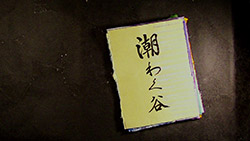 |

Ibuki’s (rejected) gift to his cruel stepmother of the expensive crystal flower was a nice touch of foreshadowing. This incident which revealed Ibuki’s true nature made clear to the audience well before the fact what his final decision would be when prompted to do “the right thing” by Ginko. A person who is willing to spend most if not all of his first ever real paycheck on an expensive, sincere gift to win the love of someone who has treated him cruelly all his life could not possibly be capable of murder…
I think the name of the snake-like Mushi is Yobiko not Yabuki?
Yeah, and I knew that too, I even have it hand-written in my notes. Stuff like that really scares me sometimes.
I like the series’ non-traditional story telling.
Sometimes everything lives happily ever after, sometimes
things continue to live not unhappily. Difficult choices
are made for the betterment of those involved. He made
her whole in two ways (first by getting rid of the Mushi)
and removed the hardship of having to try to love someone
not born of her flesh.
While he was the stronger between him and his step-mother,
she wasn’t necessarily weak; some may want to blame him,
others her. Ginko said it best one time (in another ep)
that it’s neither’s fault…
This series provides enough detail about its characters to
understand their plight, and leaves their judgement completely
up to us.
Enzo – thanks for covering!
Apologies in advance for the off-topic post, but I’m not really sure where I’m supposed to go with this.
I usually have adblock off to help support the site, but recently I’ve been getting redirects to some site diaoplayer for a fake adobe flash update which automatically starts downloading. Pretty sure this isn’t on my end, since it only ever happens on this site, but it would be nice to know if anyone else has had this issue. Turning adblock back on solves the issue for now, but you guys might wanna look into this.
For future reference, who/how do I contact whomever is responsible for the ads on this site?
Thanks for bringing that to our attention. For future reference, the most helpful thing would be to take a screenshot of the popup if possible, and email it to the address in the “Contact Me” page.
Why didn’t Ibuki sink with the other sailors?
Why does Gingko return to the doctor every once in a while?
Why would a mushi who just bear holes into rocks harm those with weak constitutions?
None of the sailors sunk. It was explained that they got to shore in a lifeboat.
Adashino-sensei is Ginko’s friend (probably his best friend). He frequently buys mushi-related trinkets from Ginko, as he’s a mushi otaku.
Who knows? We’ve seen many instances where strong mushi presence has a negative impact on certain human constitutions.
The episode outright states the rock-boring mushi are toxic, actually. People with weak constitutions thus get sick because of them if enough gather.
Reading this post after the episode really helped me understand and enjoy the show more. I sort of understand some of the little stuff that happened but didn’t really link them together till I read this…
I loved this episode.
But for some reason i feel this episode highlights human idiocy at it’s best.
Specially at the beggining, back then when Ginko warns him something bad will happen. It is natural human idiocy to throw away the advice and face the consequences.
Well in his case. The Ship sunk was a accident, while he was curious to know why he should not use his gift at night.
Place a Button somewhere on the Street, with the sign “Do not Push this Button! Or something Bad will happen!”. What do you think will happen? Curious people will try to examine it first from all sides. But someone out of curiosity will press it, just to know “what will happen!”
The curiosity is a strong force. For science it is the biggest Power to move on. for privacy groups it is the strongest enemy
But, your right. After he know what happen. he use his gift for the “Dark side”
The Jedi’s rules fit really good here
That moment. After Ginko gave his epic speech. And Ibuki chose to do the right thing. His father was scolding him. But he kept whistling to call the Torikaze. That tear in his eye.
;_;